Husky Proud
From supportive faculty, to the convenience of online classes. Find out why CPS Students are Husky Proud!
Brian LaPointe – Leadership
——–
“Being a returning student after a 10+ year gap In my academic career, it was frightening to take my first class back. I have now been back for several semesters and I am happy that all of my professors were caring and assisted in my learning curve. Getting used to the online format and working at the same time wasn’t as difficult as I had thought and having professors that care made a huge difference.”
Magdalena Kawalkowski – Project Management
——–
“I had never taken an online program until I started my journey at Northeastern University. The professors I had so far are experts in the field and extremely accommodating especially since the classes are online. So far the coursework helps my career based on the readings, professors’ knowledge, and discussion from other students. I am happy I chose Northeastern and proud to be a Husky!”
Urja Patel – Project Management
——–
“Being a part of Northeastern University has changed my life for good. I am so proud to be a husky. Northeastern has amazing professors and i would personally want to thank my academic advisor. He has been a very important part of my journey at northeastern. The help and guidance from him has turned my academic journey for good. I would also want to mention the XN projects under CPS. I believe it is an excellent program to expose the students to real work life. Thus, having so much exposure at northeastern has boosted my confidence and made me a better person. Thank you for everything. I am so proud to be a husky.”
Jacquelyn Collins – Finance and Accounting Management
——–
“Choosing Northeastern CPS to complete my Bachelor’s degree was the best decision I have made in my life so far. The flexibility of the online option has allowed me to embrace being able to work and go to school. My professors are so passionate about what they teach, which can be hard to find sometimes in online classes. I love how involved everyone is. This program has helped me in my line of work. I’ve found a lot of what I learn can be applied directly to my actual job. I’m so proud to be a part of this school, it really has changed my life. Everyone is supportive and encouraging. I can’ wait to finish my degree and maybe even go to grad school here!”
Kara Fulginiti – Global Studies and International Relations, Global Student Mobility Concentration
——–
“I am proud to be a Husky and to have the chance to pursue my educational goals online without sacrificing quality! The online Global Studies and International Relations masters program has really helped to push my career in U.S. Immigration forward. I recently obtained a position as an Immigration Specialist at the National Institutes of Health in Bethesda, MD. The NIH is the nation’s largest biomedical research institution, inviting scientists and medical doctors from around the world to the United States in order to further critical research in cancer studies and other diseases. I credit a large portion of my obtaining this new position to the skills and education I have gained through Northeastern University, which really help with my intercultural communication in my day to day work. The online format also allows me to take courses at a pace that I can manage while working full-time. I am very excited to graduate with my master’s degree in 2019 as a Northeastern Husky!”
Lisa Bolduc – Corporate & Organizational Communication – Concentration in Human Resource Management
—–
“I am proud to be a Husky! Having graduated with my undergraduate degree over ten years ago, Northeastern made the process of returning to school easy. My program is flexible with both online and on the ground classes. My favorite part of Northeastern is how welcoming and helpful the students, professors and faculty are. Everyone is eager for you to get the most out of your education. Lastly, the campus and online resources are incredibly well organized. Northeastern runs like an efficient ship, that will encourage you to never stop sailing.”
2017 CPS Graduation
Words of advice from Lindsay Levin as the College confers nearly 1,500 degrees
“In these times, it is more important than ever that we learn to be wise as well as smart. To listen to our own intuition – the still small voice inside – and choose how you will respond to whatever life brings up. What we spend our time on, how we behave towards others – the means as well as the ends. This is our agency in the world. The imprint we leave behind.”
This was the message offered to nearly 1,500 graduates at the Northeastern University College of Professional Studies ceremony by Lindsay Levin, entrepreneur, leadership expert, and Founder and Partner, Leaders’ Quest, a social enterprise organization.
Levin, whose work focuses on the transformation of companies and organizations, has created a model for learning and social change through Leaders’ Quest. She believes that leaders can be found in communities and neighborhoods, in addition to corporate offices, and that tapping into one’s own network can provide extraordinary outcomes and opportunities.
Thousands of family members and friends attended the ceremony on the Boston campus, celebrating a total of 1,491 degrees conferred— 315 Bachelor’s, 1,011 Master’s, 164 Doctoral and 1 Associate’s.
Read more about two graduates: Ryan Daley, a veteran who is looking ahead to apply his dedication and ambition to a future of politics and Fran Lee Hutton, a lifelong learner who parlayed her love of maps and her degree into a one-of-a-kind job.

Faculty Recognized for Teaching Excellence Award
During graduation, the College presented the Excellence in Teaching Award to two outstanding faculty members: Dean He and Yufeng Qian.
Nominated by students in the Doctor of Education program, Professor Qian is described by one student as “actively engaged in cultivating a dynamic online learning community, and assigns relevant coursework and discussion prompts that challenge student thinking and provide the opportunity for students to critically examine their role in the research process.” Professor He, faculty member in the Master of Science in Commerce and Economic Development program, was praised for embracing teaching as an opportunity to engage and inspire his students. One student noted: “”Professor He enhanced my confidence on a career choice. He is a teacher I respect and will keep in touch with after graduation.”
Doctoral Candidates Earn Symbol of Academic Achievement
On May 11, the College hosted a Doctoral Hooding Ceremony for candidates in the Doctor of Education, Doctor of Law and Policy, and Doctor of Physical Therapy programs symbolizing their transition from student to scholar-practitioner. Candidates received their doctoral hoods from their thesis advisers at this annual ceremony.
At every doctoral hooding ceremony, one student is selected to receive the Dean’s Medal for Outstanding Doctoral Work, the highest honor awarded by the College to a doctoral graduate. The award was established to acknowledge exemplary academic achievement and to recognize demonstrated creativity and writing quality.
This year, the Dean’s Medal winner was Dr. Ted Johnson, of the Doctor of Law and Policy program, for his thesis, “Beyond the Veil: The Electoral Uniformity and Political Heterogeneity of African American Voters.” Dr. Johnson, who is a National Security Research Manager at Deloitte’s Center for Government Insights and an Eric and Wendy Schmidt Fellow at New America, noted in his speech that he went into his doctoral studies not believing the literature reviews he conducted.
“So, I did what scholars do – I questioned it. I challenged assumptions and tackled the open questions. And I set out to create myself into the man I wanted to be: A scholar. A professor. An author. And a public intellectual on black American politics,” he said.
“The College of Professional Studies made this possible,” he went on to note. “It showed me that the reason I didn’t believe the literature reviews wasn’t because the findings were wrong – but because they were incomplete. The assembly of knowledge about any given topic – to include who you are and who you aspire to be – is never complete. Adding to the body of knowledge is our charge as doctors and a duty we each owe to ourselves.”
Dr. Chris Unger, Associate Professor in the Graduate School of Education, was the faculty speaker at the ceremony.
“Your work has just begun,” Unger stated to all the graduates before him. “And hopefully you are graduating not only with the brain of a scarecrow…but the heart of a tinman…and, importantly, the courage of a lion. I harken back to these three gifts from the movie the Wizard of Oz because I see each of these as important to your future, as both change agents and as ambassadors of Northeastern.”
“I hope we have told you to follow your passion,” Unger said in his closing remarks. “Amidst the hard work and the challenges, don’t forget from time-to-time to reflect on what it is that you care about, what drives you, and your passion. Don’t forget that. And then use your brain, your heart, and your courage to make that difference.”
About Northeastern University College of Professional Studies
The College of Professional Studies is one of nine colleges of Northeastern University, a nationally ranked private research university in Boston, MA. Founded in 1960, the College teaches undergraduate, master’s, and doctoral students on campus and online in more than 65 degree programs and is part of The Professional Advancement Network.
About the Professional Advancement Network
The Northeastern University Professional Advancement Network helps professionals participate in dynamic, experiential learning opportunities, earn degrees and certificates, build connections, and keep pace with the rapidly evolving business world—now and in the years to come. This is achieved through real-world experiences and rigorous curriculums, a supportive learning environment, and comprehensive academic and career coaching—all powered by an extensive network of alumni and employer partners. The Professional Advancement Network is an innovative approach to lifelong learning, offering access to over 200 distinctive, high-quality educational programs, degrees, certificates, and boot camps.
2016 Co-op Awards Ceremony
Excellence at Work
A Year of “Firsts” for Annual Co-op Awards; Eight Students Receive Awards
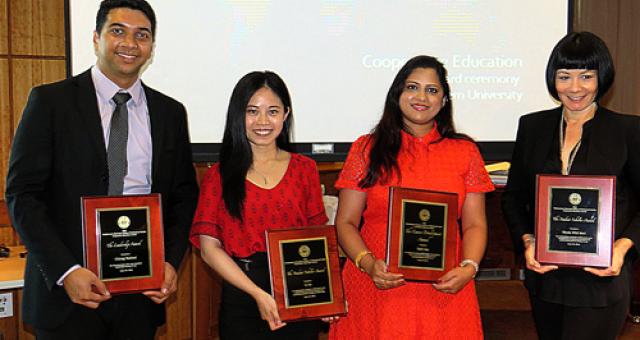
Each academic year, approximately 500 Northeastern students take part in work placements related to their field of study through the College of Professional Studies (CPS) Experiential Learning program. At the end of each year, the College honors select students at the annual Co-op Awards ceremony, based on nominations from employers.
The 2015/2016 Co-op Awards, which honored eight students, saw a series of firsts: the first award winner from the Experiential Network program; and the first recipient from the University’s Charlotte campus.
Zubi Aziz (Master of Science, Regulatory Affairs for Drugs, Biologics, and Medical Devices) received a Career Development award for her co-op at Baxalta, a start-up biopharmaceutical company. Zubi was known as the “go-to resource” in the department, according to Patricia Carolini, the head of safety analytics at Baxalta, who described Zubi as someone with exceptional integrity, character, and professionalism. They were so impressed, in fact, that Zubi has been offered a full-time position at the company.
Shuli Ciu (Master of Science, Regulatory Affairs for Drugs, Biologics, and Medical Devices) also received a Career Development award after completing two co-ops at Cerulian Pharma, Inc., first in regulatory affairs and then in clinical operations. Tiffany Crowell, vice president of clinical operations, saw Shuli “grow from an observing student to become an active participant in clinical trials, working well in cross-functional teams.”
Pamela Darcy-Demski, (Master of Science, Corporate and Organizational Communication) received the new Experiential Network Award, designed to recognize students involved in short-term projects offered through a corporate sponsor. Pamela conducted a feasibility analysis on Massachusetts State Police Academy’s use of technology in training cadets, helping it transition to a more user-friendly cloud technology. Melinda Lovick, the e-learning coordinator for the academy, spoke of Pamela’s capacity to “exercise professionalism and poise and routinely go above and beyond.”
Jennifer Krajewski (Master of Science, Regulatory Affairs for Drugs, Biologics, and Medical Devices) was awarded the Integrative Experiential Learning Award for students who participate in a co-op in their own place of employment. In Jennifer’s case, this was TreeHouse Foods, where she led a cross-departmental initiative to update labels based on the release of the State of Vermont’s Genetically Modified Food Labeling Regulation—all outside of her normal duties at the company. Her new role increased her contact with staff from other departments. “This program set me up for some of the best learning experiences I have had at Northeastern so far,” said Jennifer in her acceptance speech.
Kyle Moore (Master of Arts, Homeland Security) was one of two recipients of a Leadership Award for his work with the National Guard Homeland Security Institute. Captain Christopher Johnson, deputy director of the Institute, praised Kyle’s hard work on a small team of four staff members leading national and state-level initiatives. “People are better protected and better able to respond to disasters than they were before, thanks to work that Kyle did,” said Captain Johnson.
Nicole Wilde Merl, (Master of Science, Corporate and Organizational Communication), a student at Northeastern’s Charlotte campus, was awarded the Student Scholar Award for initiating a virtual co-op with Washington, D.C.-based public relations agency, Thomas Cooke and Associates. Nicole described her internship as a “true two-way internship” with faculty and Thomas Cooke equally invested in the project, which created a social platform to empower women to vote in 2016 and beyond through a project called WomenVotes.org.
Chirag Rathod (Master of Science, Project Management) was a recipient of the Leadership Award. Joe Flynn, Northeastern alumnus and director of inside sales for Akamai Technologies, credited Chirag for helping his company secure a $1 million deal, its biggest that year, and praised Chirag for leading by example, seeing the big picture, and coming up with creative solutions to challenges. “I never felt like an intern,” Chirag said in his acceptance speech. “I was always encouraged to participate in every team meeting and was given an opportunity to innovate and challenge the traditional way of working without having that fear of failure.” Chirag has since been offered the opportunity to stay on with the team full-time.
Qi Qin (Master of Science, Global Studies and International Relations) was awarded the Student Scholar Award for her work with Quincy Asian Resources. As an outreach specialist, Qi hired, trained, and supervised a team of eight bilingual undergraduate students and volunteers, and, in the words of Executive Director John Brothers, “the department‘s performance improved remarkably under her leadership.” She has now transitioned into the role on a permanent basis.
Two Faculty Honored for Excellence in Teaching
Each year, Northeastern University College of Professional Studies honors two faculty members for their excellence in teaching. This year, the recipients were Corliss Brown Thompson and Darin Detwiler. Both were honored at the College’s graduation ceremony on May 13, 2016.
Corliss Brown Thompson, PhD
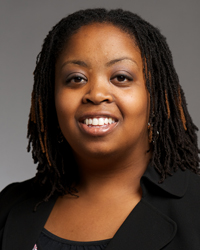
Nominated by students in the Graduate School of Education, Dr. Corliss Brown Thompson, Assistant Teaching Professor, is a recipient of the 2016 Excellence in Teaching Award in the College of Professional Studies.
Dr. Thompson’s students point to her excellence as a “scholar, teacher, and guide,” and note her ability to help them realize meaningful and impactful community engagement strategies in their work. She approaches the teaching of social justice with a “supportive learning environment without judgment.” In the words of another nominator, Dr. Thompson is “an extraordinary faculty member who pushes each of her students to make social change in real time and not just dream about it.” Her nominations also cite her caring and compassion for students, which makes a real difference in their achievements of success.
Dr. Thompson’s colleagues find her a “compelling presence” in the Charlotte, NC doctoral cohort, and commend her efforts to “uphold the diversity of our students in our mission to couple research and theory to effect meaningful change.”
Prior to joining the College, Dr. Thompson earned a PhD from the University of North Carolina at Chapel Hill in Education with a focus in Culture, Curriculum, and Change, and also served as a teacher in the Chapel Hill-Carrboro City Schools and the Charlotte-Mecklenburg Schools. She has been an integral part of the College of Professional Studies’ regional efforts in the Southeast as well as in our broader educational programs. Her research agenda focuses on culturally responsive curriculum, diversity, and teacher education, areas in which she publishes and presents. Currently, Dr. Thompson is working on a study with colleagues that examines the development of meaningful social justice courses in an online format.
Darin Detwiler, MA
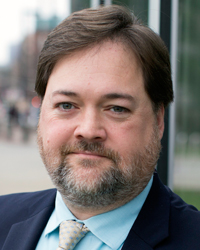
Nominated by students in the graduate studies Regulatory Affairs of Food and Food Industries program, Lecturer Darin Detwiler is a recipient of the 2016 Excellence in Teaching Award in the College of Professional Studies.
Detwiler’s students call him an “outstanding and engaging” instructor who shares an enormous passion for his discipline, which he instills in others. As examples of his excellence, students wrote that he created a model of online learning that fosters a creative, collaborative approach, and that he facilitates a real-time, engaged learning environment that greatly impacts his students. “Professor Detwiler has been the best professor I’ve had,” wrote one student. “He shares his experience with students and engages with us to discuss our individual needs.”
Detwiler left a career as a submarine nuclear mechanical engineer in the U.S. Navy due to the loss of his young son to an E.coli outbreak in 1993. Resolved to take action, he has spent over 20 years in food regulatory affairs and has gained a track record in federal food policy reform testifying before the U.S. Congress on the state of food safety and working with both the U.S. Department of Agriculture (USDA) and the U.S. Food and Drug Administration (FDA) to strengthen food safety regulations. The Secretary of Agriculture appointed Detwiler to serve two terms as a USDA regulatory policy advisor on the National Advisory Committee on Meat and Poultry Inspection. Key products of his efforts are the federally mandated Food Safe Handling Instructions labels, which since 1994 have been required on all packages of meat and seafood sold in stores across the country, and the inclusion of victims and consumer advocates as stakeholder voices in the FDA’s development of rules for the Food Safety Modernization Act.
Prior to joining the College, Detwiler taught in secondary and postsecondary education, including teaching secondary History, Math, Science, Biotechnology, and Forensic Science for 15 years, and Humanities and Comparative Governments at Bellevue College in Washington for five years. In 2013, he received the Washington State Governor’s Award for Excellence in Teaching History.
Detwiler is a candidate for the Doctor of Law and Policy degree at Northeastern University.
About the Excellence in Teaching Awards
Nominations for this award are made by currently enrolled students. All full-time, half-time, and part-time faculty members are eligible for nomination. The nominations are reviewed by a committee appointed by the Dean of the College, which makes its recommendations for the annual award to the Dean.
In considering nominations, the committee seeks candidates who demonstrate especially high intellectual standards in terms of course content, rigor, and integration of the best scholarship; depth of knowledge in the subject; and evidence of scholarly and pedagogical growth as new knowledge is created and new classroom technology is developed.
Excellence in teaching also is defined as making effective and inspiring links between teaching and practice and/or experiential learning, as well as employing effective teaching strategies that encourage students to participate in the teaching-learning process. These strategies include, but are not limited to, innovative uses of technology to enhance student learning. The award also encompasses measures of the candidate’s breadth and depth of impact on undergraduate, graduate, or doctoral students’ intellectual development; an exceptional ability to communicate and otherwise ensure a rich learning experience; and other extraordinary, unique, or pioneering contributions to excellence in teaching.
The Excellence in Teaching Award is given once each calendar year.
College of Professional Studies 2016 Graduation
“Let Your Imagination Set Your Limit”
Words of Advice from Retired Army General David D. McKiernan as Northeastern University College of Professional Studies Confers More than 1,000 Degrees
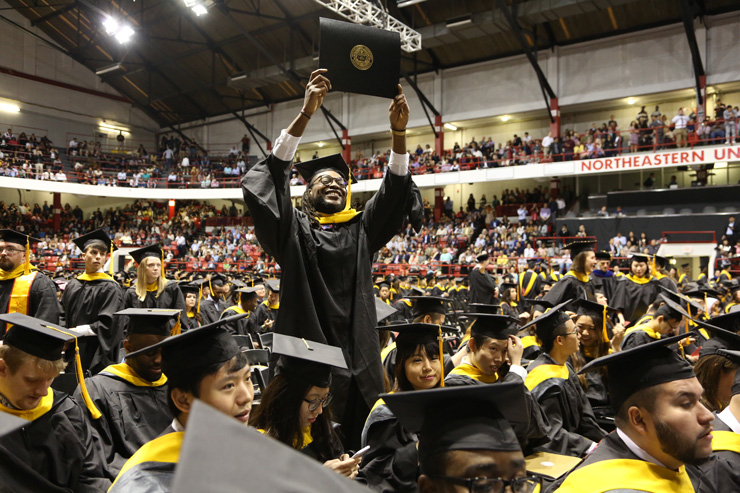
“When you walk out that door today, the future is in your hands, and your minds…. there’s no magic key to happiness and success. That requires competency, commitment, courage and lifelong development. “
That was the guidance offered this morning to more than 1,000 graduates at Matthews Arena on Northeastern’s Boston campus by graduation speaker Retired Army General David D. McKiernan, the former top commander of U.S. and NATO forces in Afghanistan.
Thousands of family members and friends were in attendance, celebrating a total of 1,016 degrees conferred— 6 Associate, 212 Bachelor’s, 670 Master’s, 7 Certificate of Advanced Graduate Studies, and 121 Doctoral.
McKiernan, who once led U.S. forces in Iraq and Afghanistan and who was in charge of joint forces from NATO and 42 contributing countries, retired from the Army in 2009. He has served as a special advisor to senior leaders of Northeastern on the expansion of the university’s programs for veterans and active duty military. McKiernan’s speech comes at a time when the number of degrees conferred to veterans in the first half of 2016 has grown 46% compared to the same time period in 2011. Today, 38 veterans graduated – 17 undergraduates and 21 at the graduate level.
McKiernan had five pieces of advice for graduates. “Think of it as advice from someone who has been around the global block and experienced the good, the bad and the ugly,” he said.
- Be a creative thinker.
- Don’t shy away from getting outside your comfort zone.
- If you want to be a leader, it is all about interpersonal skills.
- Demonstrate the notion of empathy. “As we say in the Army, ‘The view is different depending on what hill you’re standing on,’” he added.
- Be of service to America or the country you’re a citizen of, through professional, volunteer or charitable venues. Think about ways you can serve people.
Faculty Presented with Teaching Excellence Award
During graduation, the College presented the Teaching Excellence Award to two outstanding faculty members: Darin Detwiler and Corliss Brown Thompson.
Nominated by students in the Master’s in Regulatory Affairs of Food and Food Industries program, Detwiler’s students called him an “outstanding and engaging” instructor who shares an enormous passion for his discipline, which he instills in others. While the students nominating Dr. Brown Thompson, faculty member in the Graduate School of Education, point to her excellence as a “scholar, teacher and guide,” and note her ability to help them realize meaningful and impactful community engagement strategies in their work.
Students Receive Degree of the Highest Honor: Their Doctorate
On May 12, the College hosted a Doctoral Hooding Ceremony for candidates in the Doctor of Education, Doctor of Law and Policy, and Doctor of Physical Therapy programs symbolizing their transition from student to scholar-practitioner. Candidates received their doctoral hoods from their thesis advisers at this annual ceremony.
At every doctoral hooding ceremony, one student is selected to receive the Dean’s Medal for Outstanding Doctoral Work, the highest honor awarded by the College to a doctoral graduate. The award was established to acknowledge exemplary academic achievement and to recognize demonstrated creativity.
This year, the Dean’s Medal winner was Dr. Hunter Hustus, in the Doctor of Law and Policy program, for his thesis titled “Nuclear Arsenals at Low Numbers: When Less is Different.” Hustus, who completed his Master’s degree 20 years ago and spent 20 years in the Air Force, noted in his speech how the doctoral program allowed him to rethink what he already knew, develop new perspectives and how the diversity and support within his cohort contributed to his education. “It was an ambitious project,” Hustus remarked. “While many of the results were unexpected, the biggest surprise was in how much I enjoyed doing the research.”
Dr. Cordula Robinson, an Associate Professor in the Master’s in Geographic Information Technology program, was the faculty speaker at the ceremony. Robinson noted in her speech how her PhD marked the beginning of a life-long adventure for her: she lived and worked in three countries, studied Viking data from the planet Mars, worked on the Magellan mission to Venus, had an asteroid named after her and worked with indigenous people in North Africa and the Middle East on the issue of water scarcity, among many other things. Her advice to the doctoral graduates before her?
“My PhD truly marked the beginning of this life-long adventure and way of living and so it may be for you. It may not always be easy, and will require perseverance and patience, but it can always be interesting. Continue to represent your experience to your best ability while retaining the panoramic view. To put in motion what your PhD inspired, to integrate your wisdom with practice, and to set forth to be the world’s next senior managers and policy makers, advanced clinicians in a dynamic healthcare system, or prepare for executive leadership and curriculum design. To be trailblazers, innovators, and future leaders.”
3 In-Demand Careers in Regulatory Affairs

A faculty member in Northeastern’s Master of Science in Regulatory Affairs for Drugs, Biologics, and Medical Devices program, Dr. Amato’s research has been published extensively. He serves on the board of directors for several organizations, including BioSignostix, the Medical Development Group, and the Association of Graduate Regulatory Educators.
The ability to ensure that drugs, biologics, and medical devices are safe for use and effective for patients continues to be a very desirable professional skill set.
I tell my Regulatory Affairs master’s students that—regardless of where they work and the particular product line they focus on—they need to keep an eye on developing trends in the industry as a whole. Anticipating what’s to come ensures they’re prepared to move when the right opportunity arises.
Here are three career trajectories I see as “hot” right now and becoming even more in demand over the next few years:
1. Quality assurance professionals
Quality assurance professionals are responsible for making sure that companies’ quality management systems are designed properly—and adhered to. These experts see that standard operating procedures (SOPs) are always followed, and their role is especially in-demand because it’s cross-functional and supports all aspects of an organization.
2. International regulatory affairs experts
Increasingly, companies in the drug, biotech, and medical device industries are broadening their markets on an international scale. Professionals who are fully versed in the regulatory environments of other countries—particularly up-and-coming players like India, China, and Brazil—are highly sought after and that trend is expected to continue.
3. Electronic documentation specialists
While many Regulatory Affairs professionals are accustomed to submitting paperwork, more and more companies are now submitting electronic forms—such as the Electronic Common Technical Document (eCTD)—for product marketing approval. If you excel at using electronic systems and teaching others how to use them, you’ll be a valuable asset to any organization.
What Regulatory Affairs roles most interest you? Why?
Learn more about career paths in Regulatory Affairs:
- Regulatory Affairs Professionals Society (RAPS)
- The Organisation for Professionals in Regulatory Affairs (TOPRA)
Northeastern Graduates: “What World Do You Want to Live In?”
Northeastern University College of Professional Studies Confers More than 1,100 Degrees
“What world do you want to live in?”
That was the question posed this morning to more than 1,000 graduates at Matthews Arena on Northeastern’s Boston campus by graduation speaker Dr. Fred Frelow, education and scholarship senior program officer at the Ford Foundation, one of the largest foundations in the U.S. driving social change.
Thousands of family members and friends were in attendance, celebrating a total of 1,123 degrees conferred—14 Associate, 235 Bachelor’s, 732 Master’s, 10 Certificate of Advanced Graduate Studies, and 132 Doctoral, one of the largest graduating classes of doctoral graduates to date. On Thursday, May 14, the College hosted a Doctoral Hooding Ceremony for candidates in the Doctor of Education, Doctor of Law and Policy, and Doctor of Physical Therapy programs symbolizing their transition from student to scholar-practitioner.
Frelow, who has dedicated his career to the transformation of education, encouraged all graduates, no matter what degree they earned, that “…whatever field you may work in after graduation, you can have an impact on other people and on the world around you that you may not realize or be able to measure until many years later.”
In addition to one of the largest graduating classes of doctoral graduates, this year’s class included other “firsts” and special guests connected to Northeastern around the world:
First Homeland Security Graduating Class
Eleven students in the Master’s in Homeland Security are the first to graduate since the program’s inception in 2013. They studied intelligence gathering and analysis, emergency planning and management, and social psychology, among other skills. Recently, National Guard Bureau Chief General Frank J. Grass, a four-star general, praised the program’s first-of-its-kind partnership with the National Guard.
First Graduate from Boston Ballet Program
Sarah Wroth is the first dancer to graduate from the unique program between the Boston Ballet and the College, which allows dancers to pursue their degrees while dancing, preparing them for a career outside of ballet once their dancing careers end. Wroth graduated with her Master’s in Nonprofit Management.
Students from Hong Kong and Vietnam Programs Graduate in Boston
Students in Northeastern’s Doctor of Education program in Hong Kong celebrated as the first graduating cohort of the program. Three of the four graduates traveled to Boston to take part in graduation: Ratanaporn Choklap, Ching Wai Rebecca Ong, and Daya Datwani Choy.
Additionally, the first nine graduates of the College’s joint Master’s in Leadership program with International University, in Ho Chi Minh City, Vietnam, marked the first cohort to complete the program, which was established in 2012. The College welcomed one of the students, Quang Pham, to graduation.
Exemplary Teaching and Social Impact
During graduation, the College presented the Teaching Excellence Award to two outstanding faculty members: Dr. Joseph McNabb and Cynthia Lynn Beers. The College also awarded the Dean’s Social Impact Award to William A. Lowell, for his lifetime of commitment to providing opportunities in education. Lowell is a trustee of the Lowell Institute, an educational foundation formed by his family in 1836 and one of the oldest continuing foundations in the country. Most recently, the Lowell Institute awarded $4 million to re-imagine the Lowell Institute School at the College as a first-in-the-nation undergraduate school focused on students completing degrees in science, technology, and engineering in preparation for participation in the innovation economy.
Students Receive Degree of the Highest Honor: Their Doctorate
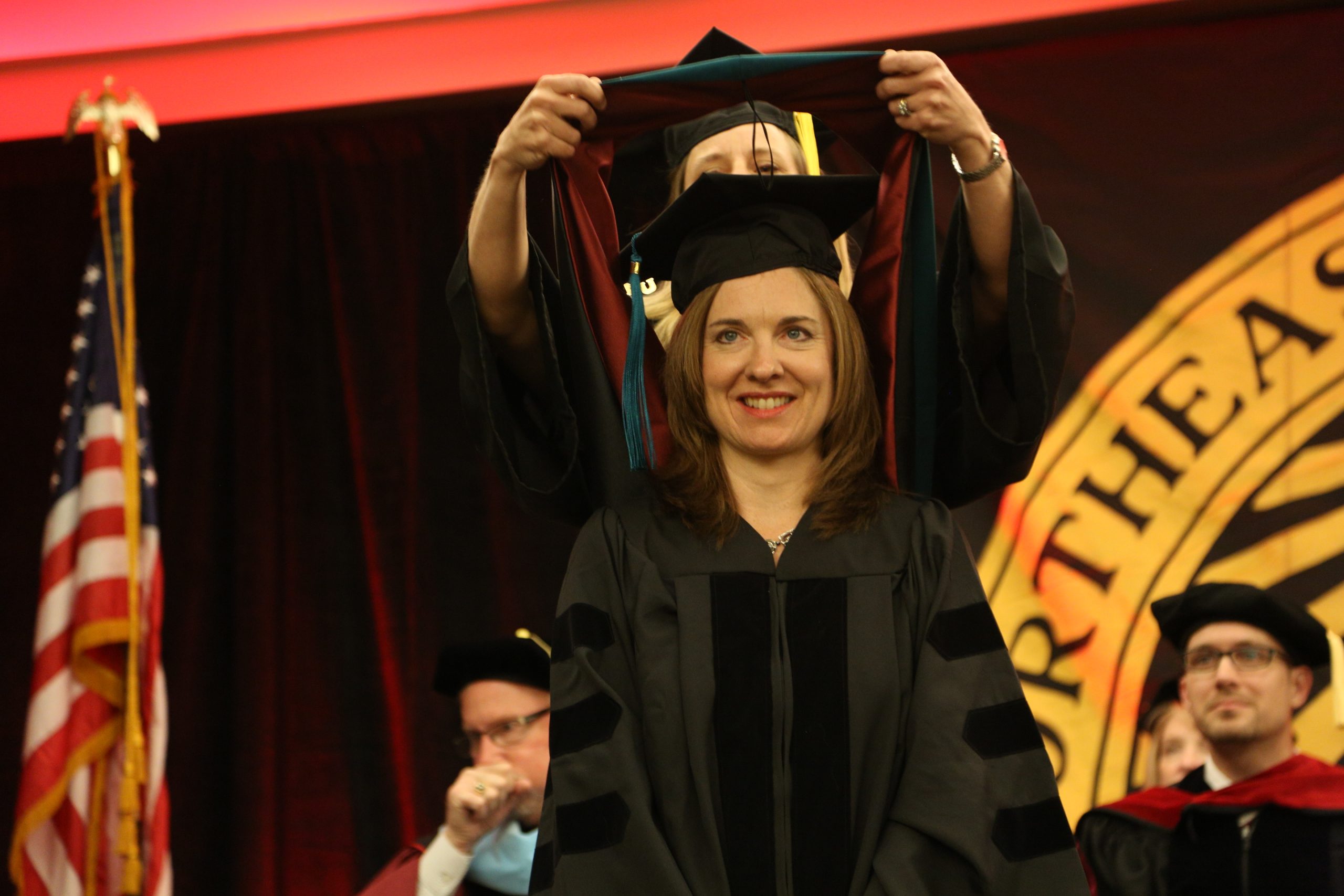
Dean’s Medal Winner, Dr. Lyne Archambault-Ezenwa, is hooded by her thesis advisor.
On May 14, doctoral candidates of the Doctor of Education, Doctor of Law and Policy, and Doctor of Physical Therapy programs received their doctoral hoods from their thesis advisers at the College’s annual hooding ceremony.
At every doctoral hooding ceremony, one student is selected to receive the Dean’s Medal for Outstanding Doctoral Work, the highest honor awarded by the College to a doctoral graduate. The award was established to acknowledge exemplary academic achievement and to recognize demonstrated creativity.
This year, the Dean’s Medal winner was Dr. Lyne Archambault-Ezenwa for her thesis titled “A Comprehensive Physical Therapy Approach to the Evaluation and Treatment of Constipation—A Case Report,” which addresses a diagnosis not usually considered in the realm of physical therapy treatment. Her thesis advisers note in their nomination that “her work provides education to the consumer and medical community, highlighting the importance of comprehensive evaluation to include a whole body approach.” Dr. Archambault-Ezenwa has her own physical therapy practice and is vice president of E’ssential Health and Wellness, Inc., in Houston.
Dr. Susan Lowe, a faculty member in the Doctor of Physical Therapy program, was the faculty speaker. A Northeastern faculty member since 1989, Lowe specializes clinically in geriatric physical therapy and has taught the geriatric content for Northeastern’s physical therapy program for more than 25 years.
Lowe described the diverse range of thesis topics the doctoral graduates had researched: Doctor of Education graduates investigated such topics as students coping with parental loss; graduates in the Doctor of Law and Policy program researched the impact of employment laws on domestic violence, renewable energy, climate change, and agriculture in California; and graduates in the Doctor of Physical Therapy program provided new evidence in areas including the relationship between mild traumatic brain injury and foul tips incurred by Major League baseball catchers.
“The combined effective actions of the graduates in this room has resulted in over 175 new pieces of evidence that will positively impact the fields of education, health care, and public policy,” she said.
About Northeastern University College of Professional Studies
Northeastern University College of Professional Studies is one of nine colleges that form the university. Northeastern University is recognized for academic excellence, ranking in the top 50 universities in the United States in U.S. News & World Report, as well as ranking sixth among U.S. universities sought by international students. Northeastern is renowned for experiential education, and the College of Professional Studies incorporates this strength in career-focused professional education at the bachelor’s, master’s, and doctoral levels. Degrees reflect business needs, the reality of the present economy, and areas of professional growth and demand.
Traveling Around the World to Build a Career in Regulatory Affairs
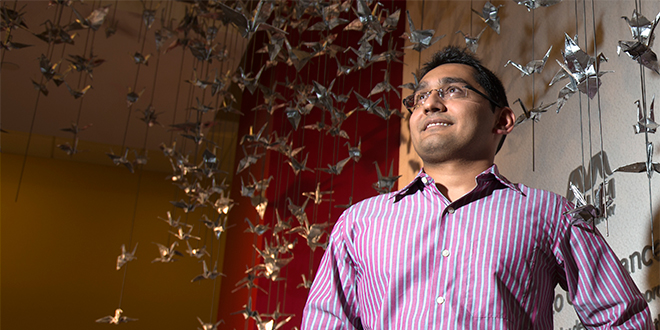
Shrenik Desai is keenly aware of his role in the complex ecosystem of modern-day healthcare delivery.
On one side are millions of cancer patients seeking new hope from the latest life-extending treatments.
On the other side are the pharmaceutical and biotech companies developing, testing, and commercializing those treatments.
In the middle, there are people like Desai, a 2012 graduate of Northeastern University College of Professional Studies, who works in regulatory affairs at Millennium Pharmaceuticals, the oncology division of Japanese drug giant Takeda. Desai and his peers are the people whose efforts largely determine how and when a promising new drug is made available to patients around the world.
“I feel extremely fortunate to be a part of the oncology research community, working every day for the betterment of cancer patients worldwide,” said Desai. “To come to work each day knowing that what we do is making a difference in the lives of so many patients is the greatest feeling one can experience.”
On the face of things, regulatory affairs may seem like an administrative function, but that is far from reality.
Strategic navigation
“Regulatory affairs is all about how you bring a product to market, how you strategically navigate the U.S. Food and Drug Administration (FDA) process,” said Desai. “Every medical product – a device, a drug, a biologic – must follow a strict process to gain FDA approval.”
It takes anywhere from 8 to 12 years for a new drug to clear the rigorous regulatory approval process. If a pharmaceutical company can get a drug patented in the United States, it will typically have exclusive rights for 20 years before it becomes available as a generic drug. Each additional day of commercial availability before a medication reaches the “patent cliff” can be worth millions.
In this challenging environment where failure is the overwhelming norm, drug companies have two essential keys to success. They need to save time, resources and costs by identifying the most promising drug candidates earlier in the development process; and they need to master the regulatory approval process to reduce time-to-market and maximize the limited window of opportunity available to new patented pharmaceuticals.
“The strategic piece of regulatory affairs involves interpreting the dynamic regulatory landscape to explore opportunities for accelerated product development, such as orphan drug, fast track, and breakthrough designations,” said Desai. “Regulatory professionals need to be proactive and forward thinking, providing timely and robust regulatory guidance to help shepherd a drug from the laboratory bench to the patient’s bedside.”
This combination of science and strategy is what first attracted Shrenik Desai to the field.
“I grew up in Gandhinagar, which is the capital of the state of Gujarat in western India,” he recalled. “No one in my family was in the scientific field. But I was always curious about science and learning about new and fascinating things, including how medicines work. As a kid, that interest was initially focused on doctors, but then I realized that it was scientists who bring those new medicines to market.”
Desai attended Rajiv Gandhi University in the state of Karnataka, where he pursued his Bachelor of Science degree in Pharmacy. Graduating with honors, Shrenik Desai began plotting his next career move. The Northeastern College of Professional Studies degree in Regulatory Affairs quickly caught his eye.
“The best thing about Northeastern is the curriculum,” he stated. “Regulatory affairs is divided into three parts: medical devices, drugs, and biologics. Some master’s programs focus only on devices; some just focus on drugs. The Northeastern program is designed to provide exposure to all three.”
When he was accepted into the program, Desai felt some trepidation. He had never been outside India and knew no one in the United States other than a few distant relatives. The College’s resources helped him get acclimated to his new life when he arrived in Boston in 2010 and quickly sharpened his English skills. However, getting used to the Boston climate took some time.
“I’m from a state in India where it has never snowed,” said Desai with a laugh. “During my first winter in Boston, I loved snow because I was seeing it for the first time. People told me, ‘Wait two years and see how much you still love it.’”
Helping the next generation
There were other aspects to being a graduate student in a new country that Desai could only learn from experience, which is why he became active in Northeastern’s International Students and Scholar Institute (ISSI). As an orientation leader, he helped other international students obtain their emigration clearance and complete U.S. documentation requirements, and organized activities to help them ease their transition to life in the United States. Since graduating, he has continued to mentor international students in the master’s program.
Shrenik Desai seemed very much at home as he walked across the Millennium Pharmaceuticals campus in Cambridge, Massachusetts in early winter. Although he had been busy filing an Investigational New Drug (IND) application with the FDA, he was looking forward to his first extended trip to visit his family in warm and sunny India. Even with snow on the ground and temperatures dipping, he didn’t bother to wear a coat.
Graduates of a University Engaged with the World
Northeastern University College of Professional Studies Confers 1,093 Degrees

Photo by Heratch Ekmekjian
With thousands of family members and friends in attendance, graduates ranging from the associate level through doctorate graduated on Friday, June 6, at Matthews Arena on the Northeastern University campus in Boston, MA.
A total of 1,093 degrees were conferred – 18 Associate, 252 Bachelor’s, 721 Master’s, 6 Certificate of Advanced Graduate Studies, and 96 Doctoral. On Thursday, June 5th, the college hosted a Doctoral Hooding Ceremony for doctoral candidates in the Doctor of Education, Doctor of Law and Policy, and Doctor of Physical Therapy programs symbolizing their transition from student to scholar-practitioner.
Graduates received advice from graduation speaker, Dr. Mark Albion, who offered two “don’ts” and three “do’s”:
- Don’t get really good at what you don’t want to do.
- Don’t defer your life plan.
- Do turn your values into value.
- Do surround yourself with a community of love.
- Do know how to measure success.
Albion is a former Harvard Business School professor and university administrator who has co-founded seven companies, including the global young leadership organization, Net Impact. Albion’s latest venture is More Than Money Careers, which provides a self-leadership, career platform that helps students, young professionals, and alumni “get clear, connected and hired” for well-paying impact jobs that fit their values—using their heads to follow their hearts.
Exemplary Teaching and Social Impact
During graduation, the College presented the Teaching Excellence Award to two outstanding faculty members: Dr. Gail Matthews DeNatale and Dr. Arsenio Paez.
And, the College awarded the Dean’s Social Impact Award to Elizabeth McLellan RN MSN MPH. She is President and Founder of Partners for World Health, a non-governmental organization dedicated to improving health care around the world by improving the medical supply chain and coordinating medical missions in Africa, Asia, and South America to promote capacity building and training.
Students Receive Degree of the Highest Honor: Their Doctorate
The previous day, Thursday, June 5, the doctoral candidates of the Transitional Doctor of Physical Therapy, Doctor of Law and Policy, and Doctor of Education programs were honored at the annual ceremony, receiving their doctoral hoods from their thesis advisers.
At each doctoral hooding ceremony, one student is selected to receive the Dean’s Medal for Outstanding Doctoral Work, the highest honor awarded by the College to a doctoral graduate. The award was established to acknowledge exemplary academic achievement and to recognize demonstrated creativity. This year, the Dean’s Medal winner was Dr. Sean Robert Gallagher for his thesis entitled Major Employers’ Hiring Practices and the Evolving Function of the Professional Master’s Degree. Gallagher is Chief Strategy Officer at Northeastern University.
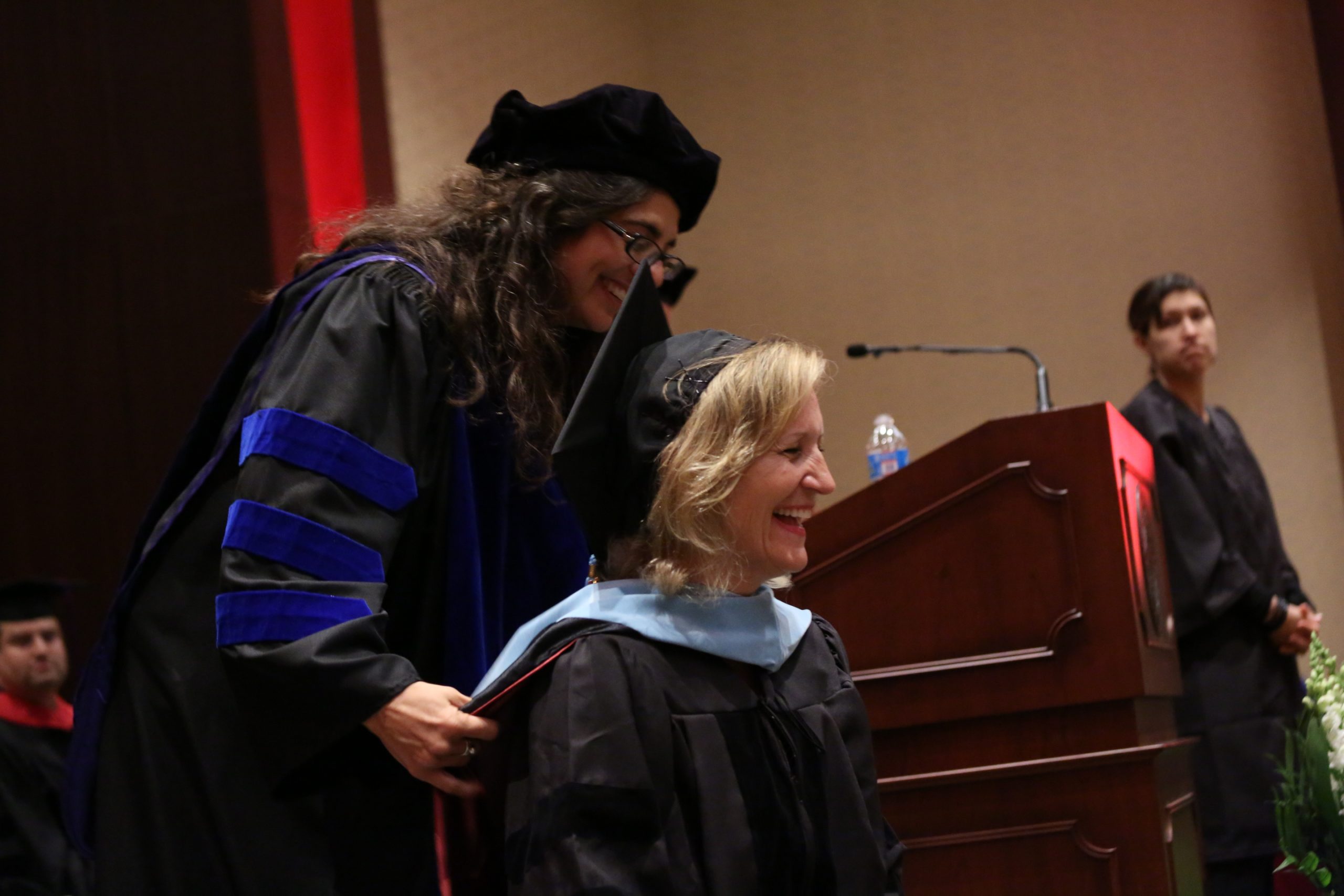
Graduation culminates the 2013-14 academic year that saw many changes at the College of Professional Studies including: Growth and Change
- Faculty member Tova Olson Sanders was one of two award recipients of Northeastern’s highest teaching honor.
- Enrollment of students in the College’s two newest degree programs: Master of Arts in Homeland Security and Master of Science in Regulatory Affairs of Food and Food Industries.
- Addition of three former ambassadors to the faculty of the Master of Science in Global Studies and International Relations degree program.
- The launch of a graduate program in Ho Chi Minh City, Vietnam – the Master of Science in Leadership degree in cooperation with International University of Vietnam.
- The arrival of Northeastern’s first cohort of students from Nigeria, studying in a summer bridge program at Northeastern and University of Vermont. Approximately 40 students from Nigeria are expected to matriculate into degree programs at Northeastern in the fall of 2014.
- Stan Phanord, a graduate of Foundation Year, the intensive first-year college program, graduated from Northeastern this year with a Fulbright Fellowship and a Rangel Fellowship, establishing his path to graduate studies and a career in diplomacy.
Northeastern University College of Professional Studies is one of nine colleges that form the university. Northeastern University is recognized for academic excellence, ranking in the top 50 universities in the United States in U.S. News & World Report and is ranked 6th among U.S. universities sought by international students. Northeastern is renowned for experiential education, and the College of Professional Studies incorporates that strength in career-focused professional education at the bachelor’s, master’s, and doctoral levels. Degrees reflect business needs, the reality of the present economy, and areas of professional growth and demand.
Most business leaders believe innovation is critical for U.S. colleges to remain globally competitive
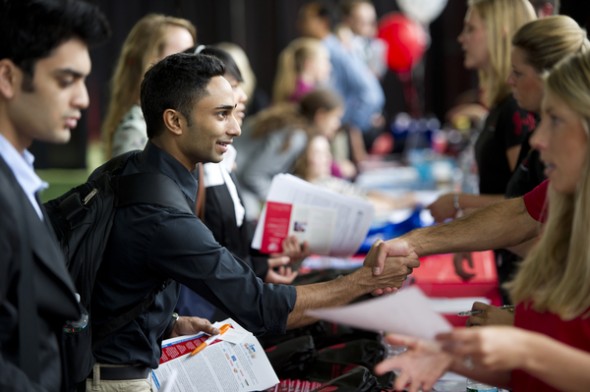
Photo by Brooks Canaday
At a time of great debate over the value of a college degree, a new national survey reveals a concern among U.S. business leaders about the pipeline of talent produced by American colleges and universities. While most executives express support for the American system of higher education, they also believe the U.S. is falling behind global competitors and inadequately preparing graduates to succeed in the modern workforce.
The new survey, the third in a series by Northeastern University, presents the views of C-suite executives, with a particular focus on global competitiveness, the employee skills gap, employer workforce investments, and opportunities for policy reform.
According to the new survey, more than half of business executives (54 percent) believe the U.S. is lagging behind developed and emerging countries when it comes to preparing college graduates for career success.
The report also highlights a concern from the C-suite about the notion of an employee “skills gap.” Nationally, 73 percent of business leaders say there is a skills gap among today’s workforce, and an even greater number (87 percent) believe that today’s college graduates lack the necessary skills to succeed.
“These findings underscore a critical call to action for all of us in higher education to innovate,” said Joseph E. Aoun, president of Northeastern. “Business leaders—who are key partners for colleges and universities—want higher education to be more experiential and want us to instill entrepreneurial qualities in our graduates.”
Regionally, business leaders have somewhat varying views. In Boston, where the concern is less widespread, only 64 percent of executives see a skills gap. In Charlotte, N.C., 71 percent are concerned about a skills gap, while in Seattle the figure is 76 percent. The Northeastern survey oversampled business leaders in Boston, Charlotte, and Seattle—the three American cities where the university maintains campuses.
Among the attributes most important for college graduates to possess, business executives rank communication, interpersonal skills, and adaptability at the top of the list. That echoes the sentiments of the majority of Americans from Northeastern’s August 2013 poll, who said so-called “softer skills” such as communications and problem solving were most important. According to the new survey, nearly one-third (28 percent) of business leaders believe that very few recent college graduates actually possess those skills.
Business leaders are divided on the question of whether college graduates will be more (27 percent), less (32 percent), or equally (39 percent) prepared for the workforce in the next 10–15 years. The findings were consistent across the samples in Boston, Charlotte, and Seattle.
In addition to the hurdles presented by the skills gap, recent graduates face a job market that is in many ways still recovering from the Great Recession. Nearly two-thirds of executives say the recession impacted their businesses, with the most commonly cited consequence being a reduction in the number of entry-level jobs.
Consistent with findings from Northeastern’s previous two surveys, C-suite executives believe that colleges and universities should develop innovative ways to educate and prepare students for the workforce.
An overwhelming majority of respondents (97 percent) say that experiential education—the integration of classroom study with professional experience—is critical to an individual’s success. A large majority of business leaders (89 percent) also believe the nation’s higher education system should expand opportunities for teaching entrepreneurship.
Other noteworthy regional findings include:
• While most U.S. business leaders (72 percent) cite personal drive as the most important factor for career success, business leaders in Boston and Seattle cite the value of mentors and advisers at a higher rate than respondents nationally. While just 27 percent of business leaders across the country place great value on mentors and advisers, the figure is 45 percent of Boston business leaders and 43 percent of their Seattle counterparts.
• Business leaders in Seattle tend to be more supportive of online college degrees. Nearly 6-in-10 Seattle executives say an online degree provides a similar quality of education as traditional degrees, compared to 47 percent in Charlotte and 45 percent in Boston.
The survey interviews were conducted by telephone among a representative sample of more than 500 C-suite executives and business leaders in the U.S. from Feb. 3–19, 2014. It includes an oversample of 300 respondents in Boston, Charlotte, and Seattle. The margin of error is +/- 4.37 for the national sample and +/- 5.65 for the regional sample.